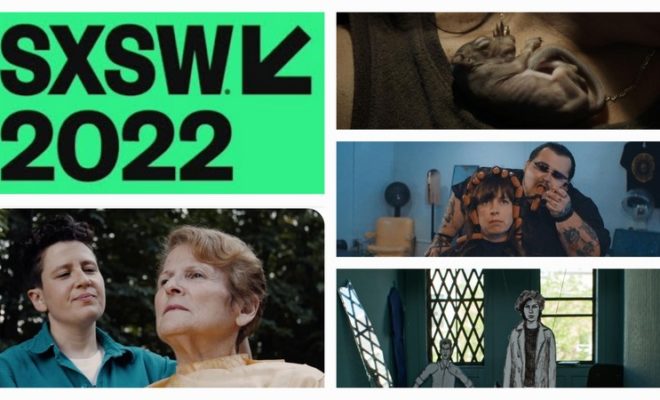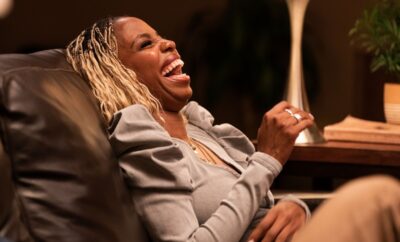
Movie Reviews
SXSW – Shorts Program 1
By: Kelly Kearney
This year’s stand out SXSW narrative short entries found us laughing at the most outrageous hairstylist in all of L.A., smuggling banned films across the Atlantic, crying with a mother whose broken heart was unexpectedly healed, and a conversation about identity between a mother and her trans son. Narrative shorts have always found a welcoming home at SXSW, but this year’s impressive selections set the bar for the short-form format.
MONSIEUR LE BUTCH
In this seven-minute short we meet Jude [Dry], a F-M trans man considering top surgery on a visit home with his mother, Cecelia [Dry]. Jude sits down with Cecilia (who incidentally is the star and director’s real-life mother) for a haircut and a discussion on language, pronouns, and body image. Cecelia, the liberal boomer and self-proclaimed MSNBC fan, has her open mind and self-image tested when her child reveals his plans to change his body to fit his preferred gender – to which she admits she hasn’t even fully invested in his updated pronouns. On this, Mom jokingly asks for “an old lady pass,” but nobody is too old to learn, and Jude does his best to lead his mother to trans allyship with patience, style and a bit of comedy. For her part, Cecelia isn’t completely closed off to the idea of supporting her son. She just needs room to ask questions and what follows is a sort of reintroduction to the child she loves. Making connections to women who struggle to look at themselves in the mirror, Cecelia starts to realize we’ve all experienced some form of body dysmorphia. Whether we want to change our noses, lose a few pounds or turn your Jell-O packs into a six-pack, we all (at times) struggle to exist in the body we were born into but for trans people it goes a little deeper than Cecelia’s mother calling her fat her whole life. This is a matter of survival for people like Jude and as his mother jokes about “manginas,” something that would normally offend in most circles today, Jude gives his mother space to grow and make connections with how his struggles relate to her own. The two continue take their battle of wits outside for a haircut. And as Jude snips away at Cecelia’s head, the two land on the topic of opening a salon, something that makes him smile as Cecelia rambles on about the first time she took her chubby-handed child for a haircut. Flipping through the long locks of female models, young Jude was predictably only interested in one look: a boy’s mushroom cut. He knew it would fit his style and, in that moment, Cecelia knew her kid had a keen sense of self and knew who they were supposed to be… “Monsieur Le Butch!” Cecelia has the perfect name for a salon owned by the little mushroom cut who grew to be a handsome Monsieur with the pronouns to match.
Capturing Jude and Cecelia’s banter and debates was the work of cinematographer, Jacob Blumberg, who bounced between the vivid colors of the Vermont backdrop to the often-subdued moments when Jude exhibits relief in moments where he is allowed to be himself. It is a freedom from the weight of his perceived identity. And what’s fascinating about this short journey we take with mother and son is how the film touches on something cis-gendered people often overlook: that trans people take on the role of teacher when searching for support. It is a thankless job they never asked to do, but out of respect for their oved ones they shoulder the weight of uncomfortable and often demeaning comments from the people they love just to walk them to acceptance.
When director Jude Hay frees himself of his chest binder to go for a swim, the camera focuses in on his changing facial expressions as we listen to his mother start to make sense of what gender and identity means. The direction partnered with the camera work tells a story that goes beyond the words spoken; it catches glimpses of pain, laughter, sexuality, and love, without ever being salacious or intrusive. It tells the story of trans life, and all of its frustrating obstacles and moments of glory. But It’s the vulnerable journey director and star Jude Hay takes us on that makes his narrative short so compelling. Millions of Trans people face these moments of confusion and pushback from their families and loved ones every day, and to document it takes bravery from both him as a director, and Cecelia, as someone who spoke her truth within the boundaries of maternal love.
For trans viewers, Monsieur Le Butch can be a familiar and possibly triggering look into the verbal back and forth so many go through when asking loved ones for their acceptance, but it does leave the viewer with hope that it is all worth it in the end. With enough love and willingness to try something bigger can come out of honest discussions on who each of us is and not what the world and, yes, even our mothers want us to be. If you’re looking for a short and honest account of one trans man’s journey to redefine himself, give this narrative short a watch.
MY DUDUŚ
A Polish empty nester finds an orphan looking for a mother in need of some maternal love in this eleven-minute documentary from director Tom Krawczyk that reminds us that love often comes in many forms and the most surprising ways.
After her son leaves her suburban Chicago home to study in Poland, a heartbroken mother finds solace in a chance encounter with an abandoned squirrel pup found in her garden. Assuming the mother of the blind and hairless two-day old pup will return, the woman watches the clock as night falls- – worried about the defenseless baby out in the cold. Armed with a flashlight, she sees the mother has abandoned the desperate baby and they might only have hours, maybe minutes, to live. Having no idea how to care for a newborn squirrel, the new foster mom makes the choice to wrap him in a blanket and bring him inside her house. Duduś, she affectionately names him, thrives under her care leaving Mom to wonder if this new baby thinks of her as his own mother and, for all intents and purposes, how can he not? “He brings me so much joy,” she admits and as we see this depressed woman blossom and bond with this tiny creature (who for his part continues to go from a sickly little baby to a rambunctious squirrel), we are left wondering who saved whom? The kindness she showed this precocious little scamp cost her nothing but the returns for her efforts were priceless, both for Duduś, Mom’s mood and even her husband who worried his wife wouldn’t get over their son living so far away.
You cannot put a dollar amount on joy and as Duduś finds his own way of managing his natural instincts within the confines of a suburban home, the fear of losing another child starts to creep into Mom’s happy mood. With motherhood comes the pain of letting go and as Duduś grows into maturity so does his mischievous and oftentimes territorial nature. Mom makes the choice to do what’s best for her new boy by letting him explore the outside world—knowing how crucial it is to his development that he learn how to be a squirrel. Even on days when it was cold and snowy, Mom pushed Duduś outside to make friends, find food, and build his nests so as to ensure his survival after he is released. Which she eventually does, after the brutal Illinois winter starts to fade into spring, she pushes little Duduś to find his own way in the world regardless of the fact she’s back to worrying herself to tears over another son. He’s one of the four men in her life now: her husband, her son, her cat, and her Duduś. A mother’s love doesn’t cease when her babies leave the nest; it’s an all-consuming love that grows from nurturer, to teacher, to friend, and Mom was all of those things for her little guy.
As the camera focuses on Mom watching Duduś nibble on snacks outside the kitchen window, she contemplates the squirrel brains and wonders if Duduś will remember her when he goes out on his own. It’s that vulnerability in her interviews, in the quiet moments you can feel her loss before it’s even happened, that are so touching. Director Tom Krawczyk found the heart of motherhood by turning eleven minutes of tears and squirrel antics into a universal understanding of love. Cycling through close ups of Mom struggling through her fears, her pride and her newfound joy, he leaves the audience cheering Duduś on and maybe even missing our own mothers enough to pick up the phone and give them a call.
Duduś might not be your typical pet or family member, but love finds ways around genetics and can build a family of its own choosing because love has always been the main ingredient in any recipe for happiness. Duduś and his mother found that in each other during a time when they both needed it.
If you love to feel good moments, animal rescue stories or just miss the warmth only found inside the arms of a maternal embrace, then this short is for you. Make sure you grab a box of tissues before you watch because this one is a happy tear-jerker.
GAY HAIRCUT
A light comedy with an indie-feel, Gay Haircut is an adventure in discovering yourself after coming out. It’s an age-old story of woman meets trans woman, woman dates trans woman and then woman questions everything from her career in comedy to the image staring back at her in the mirror. LGBTQ people are familiar with this process of “rainbow jewelry for all the world to see now that we’re out and proud,” and star Kris Fatka under the direction of Jude Harris, taps into that moment with a hysterical supporting cast that makes you want to see this short turned into a series.
Coming out can affect everything, even a comedian’s ability to craft a killer closing joke. After years of slinging dick jokes for laughs, bisexual comedian Kris (Krista Fatka) must choose between her past work or fully committing to a new queer-centric bit.
After updating her fellow comic and friend Merrill (Merril Davis) about her new girlfriend and also new bisexual status, Kris is finally loving life — except for the career part. Now that she’s out she is questioning whether or not she owes it to her fans and rainbow community to give up her dick jokes and dive into new bit. Admittedly most of her jokes are about the men she’s dated in the past and now they won’t work, so her pal Merrill offers to take them off of her hands. But Kris’ mind isn’t made up. She needs some inspiration before she pulls the trigger on her straight-centered set. Maybe a style update to go with her new bisexual life? Merrill says she knows a guy and sets her up with the best gay hair stylist in L. A…or maybe he’s the worst. It’s hard to tell after all the whipped cream, candy and fire.
The funniest moments of Gay Haircut happen inside the salon, after Zachariah (Zach Holmes) determines Kris’ aura and gets down to work, which includes emptying out the refrigerator onto her head. The DIY hot dog curlers, raw eggs and leaf blower acting as a hair dryer really turn up the laughs and it was all thanks to Zach Holmes’ performance. For their part, director Jude Harris manages to capture the quirky vibes of the L.A. gay scene – right down to the haircut reveal and the Willy-Wonka-esque boat-ride Zachariah takes Kris on.
Despite all of its ridiculous moments, Gay Haircut asks nothing of the viewer other than to realize that coming out looks different for everyone, but it’s the journey to becoming ourselves that makes us feel beautiful. If you are looking for an LGBTQ themed comedy that doesn’t take itself too seriously, give Gay Haircut a watch and the maybe call your stylist for a trim…but probably ask them to skip the mayonnaise and tin foil hat treatment.
STRANGER THAN ROTTERDAM
In 1982, the completion of Jim Jarmusch’s sophomore film Stranger Than Paradise hangs on producer Sarah Driver’s willingness to smuggle one of rock n’ roll’s most controversial films across the Atlantic Ocean. Using ink drawing cut outs turned into animated puppets, directors and brothers Lewie and Noah Kloster tell the story about the time film producer Sara Driver and Canada’s most wanted film became the answer to all of film legend Jim Jarmusch’s funding prayers– cementing his place in the indie-art house scene.
In voiceovers we watch and listen as an ink drawn Driver walks us through what led her to take that infamous cross-Atlantic risk and just what Keith Richards and The Rolling Stones had to do with it. Film funding is always the struggle of any creator and as Jim’s producer, Sarah’s job was to secure a financial backer for his 1983 Rotterdam Film Festival short Stranger Than Paradise. Together they hoped to find a backer to help Jim turn his short into a full-length feature. There was just one problem: the festival only had enough money to fly him out, not Sarah. Considering they were both living on pizza and a starving artists’ salary, if Driver wanted to attend she was going to have to finance it herself. This was especially necessary since, as she puts it, “Jim was more of an ideas guy” and planning, as well as the selling of his work wasn’t really in his wheelhouse. She needed to be there in person but finding a way proved difficult. Cue a late-night phone call from the International Film Festival Rotterdam’s director, Hubert Bals, who proposes an idea to get her to the festival. She can accompany Jim if she agrees to smuggle Robert Frank’s Cocksuker Blues out of Canada into his hands. It is the only copy in existence and back then it was hidden from the Canadian Mounties under the floorboards of Director Frank’s rural home.
The film, which depicts tour life with The Rolling Stones, was mired in controversy immediately after its 1972 release. From scenes with Keith Richards nodding off in a heroin daze to members having sex with groupies, it was Robert Frank and Danny Seymour’s fly on the wall view of rock n’ roll and all of its glorious debauchery. But not everyone was enthused with his vision. Mick Jagger tried to sue Robert into destroying it before the movie landed in theaters. Likewise, the Canadian Mounties also wanted to get their hands on the content after Keith was arrested for possession of heroin. Both saw the documentary as evidence of the band’s lurid drug use and possible distribution, which wasn’t as easily shrugged off as it would be today. The country’s case against Richards would be a slam dunk and that’s why Robert hid the reels at his house. Nobody, not even the “Dudley Doo-rights” (as Sarah refers to the Mounties) could find it until she met Robert and convinced him to hand it over. But her worries didn’t end there; at the time a film of that nature was considered pornographic and transporting it internationally was a crime. It’s why Sarah winds up getting stopped by an Amsterdam customs agent only to be released shortly after when the man reveals himself to be a Rolling Stones fanboy desperate to see the most talked about film.
In the end, Driver manages to deliver Cocksucker Blues to Hubert Bal and the rest is indie-film history. Jim’s short secured the funding needed to turn it into the film Stranger Than Paradise is today and he went on to become the celebrated filmmaker he is today.





You must be logged in to post a comment Login